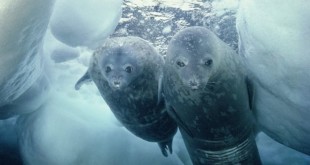A Smithsonian and University of Michigan study published Wednesday in the journal Nature offers a decisive answer: Biodiversity’s power in the wild does not match that predicted by experiments—it surpasses it.
September, 2017
-
7 September
Hurricane Irma’s epic size is being fuelled by global warming
It’s a monster. As the eye of Hurricane Irma approached the tiny island of Barbuda this morning, wind speeds soared to 250 kph before the instrument broke.
-
6 September
Antidepressants accumulating in fish brains: study
Human antidepressants are building up in the brains of bass, walleye and several other fish common to the Great Lakes region, scientists say.
-
6 September
Aquaculture limits: shrimp farming destroys mangroves
Out of the 270,000 hectares that covered the Vietnamese coast in 1980, only 60,000 remain, according to government data.
-
6 September
More ‘losers’ than ‘winners’ predicted for Southern Ocean seafloor animals
A new study of the marine invertebrates living in the seas around Antarctica reveals there will be more ‘losers’ than ‘winners’ over the next century as the Antarctic seafloor warms.
-
4 September
How the demand for sand is killing rivers
Exploding population numbers and the knock on need for development have made sand the second most used natural commodity on the planet after water. Billions and billions of tonnes are being used across the globe.
-
2 September
Mumbai floods: what happens when cities sacrifice ecology for development
As the storm that was hurricane Harvey deluged the areas around Houston, Texas, large parts of northern India, Nepal and Bangladesh also experienced heavy rains.
August, 2017
-
31 August
Global warming doubles growth rates of Antarctic seabed’s marine fauna – study
Experiment in the Bellingshuan Sea reveals temperature rise has more alarming implications for biodiversity in polar waters than previously thought.
-
31 August
Blood spills on to the shores of the Danish Faroe Islands, again
Known as the grindadráp, the brutal slaughtering of pilots whales in the Danish owned Faroe Islands took place again yesterday. As many as 50 pilot whales were reportedly massacred as locals used spinal lances to slay all of the pilot whales.
-
30 August
Protect herbivores, preserve coral reefs
Scientists from Scripps Institution of Oceanography predict that protection of seaweed-eating fish and invertebrates will help maintain the health of a Hawaiian coral reef by leveling the competition between fast-growing seaweed and slow-growing coral.
-
30 August
Scientists think they know why the Caspian Sea is shrinking
The Caspian Sea is about as strange as a body of water gets. Its surface still sits 27.5 meters (90 feet) below sea level, and water doesn’t flow out of it—it’s isolated from the oceans, and relies on a series of Asian rivers to maintain its levels.
-
30 August
Century-old seal pelts reveal changes in Ross Sea ecosystem
By using sophisticated isotope analysis to compare samples from modern and century-old seals, the researchers were able to investigate an urgent question about human impacts on the Antarctic ecosystem: Is the targeting of Antarctic toothfish by a small fishing fleet operating in the Ross Sea changing the structure of the …
 Ocean Sentry
Ocean Sentry











